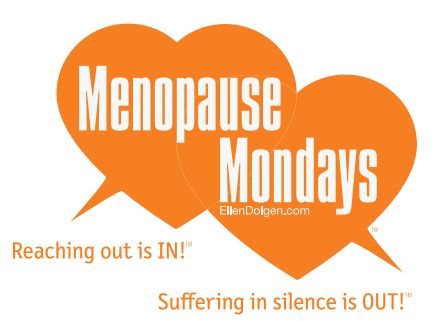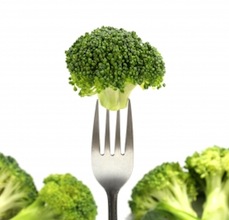
An apple a day keeps the hot flashes away. OK, not really, but it's not as far off as you might think.
Diet is a huge factor in how perimenopausal and menopausal women feel and act, according to Susan Wysocki, WHNP, FAANP, president at iWoman's Health. Research shows that what women eat can either quell or exacerbate just about every menopausal symptom from hot flashes and night sweats to mood swings and weight gain, she says. "The key to eating right during perimenopause and menopause is to eat foods that will improve health as much as they are to keep symptoms of menopause at bay," she says. Unfortunately, most of us are filling up with the wrong foods. No more!
Here are three tips for eating your way to a healthier, happier menopause:
Pick More Produce

"Certain fruits and vegetables have a mineral called boron that may increase estrogen levels in certain women," says Wysocki. However, even if produce doesn't pick up your estrogen production, it can still do a menopausal body good. One large-scale study published in Menopause found that menopausal women who lost weight eating a low-fat diet rich in fruits and vegetables reduced or eliminated their hot flashes and night sweats. Talk about a two-in-one benefit: Fruits and vegetables can reduce your hot flashes and help you avoid menopausal weight gain. During perimenopause and menopause, many women gain weight as reduced estrogen levels trigger cells to store more fat, according to new research from Mayo Clinic.
Find the Right Fats
New research published in the American Journal of Clinical Nutrition found that menopausal women who most closely follow a Mediterranean diet rich in produce, whole grain pasta, and healthy fats cut their risk of hot flashes and night sweats by about 20 percent. Meanwhile, menopausal women who eat diets high in sugar as well as saturated and trans fats increase their risk by 23 percent. "Research has also shown that trans fats increase bad cholesterol in the body and decrease good cholesterol, and too much in the diet could result in memory loss and an inability to concentrate, both of which some women experience as symptoms of menopause," Wysocki adds. Your move: Avoid foods such as butter, fast food, and baked goods that are rich in saturated and trans fats and opt for foods such as fish, olive oil, and canola oil that are rich in unsaturated, good-for-you fats.
Pass on Processed Foods
Packaged foods are breeding grounds for sugar and salt, according to Wysocki. "Refined carbs such as white bread, rice, pasta and potatoes release glucose into the bloodstream quickly, which can lead to high-low mood swings and weight gain, not to mention making you feel tired. Opt for low-glycemic carbs like wholegrain breads, cereals, and pastas that will provide energy without causing moodiness and fatigue," she says. Likewise, opt for sugar-free drinks such as water and tea. Contrary to what most women think, even diet sodas aren't safe. Artificial sweeteners trick the body into thinking it's getting sugar. That means when you really do consume any sugar, your hips, butt, and belly will hold onto it as fat, Wysocki says. The simple way to find your grocery's whole foods: Stick to the perimeter of the store. Many grocery stores are designed with whole foods like produce and lean meats around the perimeter. "Be careful in the aisles," she warns. "That is where a lot of the 'non-food' food is." If it comes in a box, can, jar, or bottle, read the label.
Food is fuel. So when we start eating to live rather than living to eat, it's about impossible not to feel better in our bodies--especially when those bodies are going through all the changes of perimenopause and menopause. Still, that doesn't mean we can't indulge in the occasional pint of ice cream or candy bar from the checkout aisle; but "occasional" is the operative word. Remember: Absence makes the heart (and taste buds) grow fonder!
Reaching out is IN! Suffering in silence is OUT!
Let's hang out! The first Monday of every month at 5:30pm PST/8:30pm EST, Ellen is hosting her Menopause Mondays Google Hangouts: Where the Sisterhood helps the Sisterhood. Her July 1 hangout will include women's sexual health expert Dr. Ricki Pollycove! Send your questions here today! Get ready to talk menopause with Ellen and Dr. Pollycove at this free online event! Details and RSVP here.
For more by Ellen Dolgen, click here.
For more on women's health, click here.
Ellen Dolgen is an outspoken women's health and wellness advocate, menopause awareness expert, author, and speaker.
After struggling through the silence that surrounds menopause, Ellen resolved to help women reach out and end the confusion, embarrassment, and less-than-lovely symptoms that come with "the change." Her passion to be a "sister" to all women fueled Ellen's book, Shmirshky: the pursuit of hormone happiness. As a result of her women's wellness journey, and in response to the overwhelming thirst of her ever-expanding audience for empowering information, Ellen's weekly blog, Menopause MondaysTM was born.
Menopause MondaysTM allows Ellen an expansive platform from which she broadens her discussion of menopause, women's health, and life as a menopausal (and fabulous!) woman. Her weekly Menopause News Flash provides a one-stop shop for the latest menopause and women's health news and research, allowing women the access and know-how needed to take charge of their health and happiness. In addition to Ellen's ever-growing social media presence, EllenDolgen.com has fast become "the place" on the web for informative and entertaining women's menopause and wellness engagement. In 2012 EllenDolgen.com was named first on the list of the "Best Menopause Blogs" by Healthline. Ellen is also a regular contributor to over a dozen leading women's health blogs. Her motto is: Reaching out is IN! Suffering in silence is OUT!
Ellen has appeared on the "TODAY Show," the "Rachael Ray Show," "The Doctors," Oprah Radio, Playboy Radio, NPR's "Tell Me More," Doctor Radio, and dozens of regional and national media outlets. Ellen is also one of the first regular contributors to debut on The Huffington Post's recently added site, Huff/Post50, which targets 116 million Americans over the age of 50.
Click here to read Ellen's full bio
Like Ellen Dolgen on Facebook, follow her on Twitter and Pinterest, connect with her on LinkedIn, Google+, and Klout, watch her videos on YouTube, and subscribe to her newsletter.
Earlier on Huff/Post50:
Exercise
<a href="http://skincarebyroxy.blogspot.com/2010/08/menopause-and-treatment.html">"Exercise is absolutely critical,"</a> says Susan Moores, a registered dietician. Exercise can be a powerful sleep aid, combating the sleep disturbances many women complain about. It has been shown to improve the whole gamut of menopause symptoms from hot flashes to mood swings. She says not to just focus on aerobic exercise, but also try strength training and relaxation techniques, such as <a href="http://body.aol.com/fitness/yoga" target="_hplink">yoga</a>.
Flaxseed
"Flaxseed falls in the same camp as soy for the phytoestrogens," says Susan Moores, a registered dietician. One study by the Mayo Clinic found the incidence of hot flashes was reduced as much as 50 percent by consuming flaxseed. It is also thought to be very promising because, along with phytoestrogens, it also contains omega-3 fatty acids, which can aid in mood stabilization. According to <a href="http://body.aol.com/alternative-medicine/flaxseed" target="_hplink">A.D.A.M.</a>, an online health content provider, when compared to hormone replacement therapy, 40 grams of flaxseed was reported to be equally as effective in reducing hot flashes, vaginal dryness and mood disturbances.
Black Cohosh
Two German studies have shown black cohosh to be effective in reducing hot flashes, according to <a href="http://body.aol.com/alternative-medicine/black-cohosh" target="_hplink">A.D.A.M.</a> One study in particular showed 80 percent of women saw a decrease in hot flashes while using black cohosh. However, no long-term studies have been done and there have been reports of side-effects including upset stomach and low blood pressure, caution the experts at <a href="http://body.aol.com/menopause/learn-about-it/treating-menopausal-symptoms/herbal-products" target="_hplink">Harvard Medical School</a>.
Natural Progesterone
This over-the-counter cure uses progesterone or progesterone-like compounds as the active ingredient. "Natural progesterone is a hormone and it works," says <a href="http://www.everydayhealth.com/womens-health/specialist/marcie-richardson/index.aspx">Dr. Marcie Richardson,</a> obstetrician and gynecologist at Harvard Vanguard Medical Associates and Beth Israel Deaconess Hospital in Boston. "Skin creams that contain extracts of Mexican wild yams have been widely promoted for natural menopause relief for years," says <a href="http://body.aol.com/menopause/learn-about-it/treating-menopausal-symptoms/over-the-counter-products" target="_hplink">Harvard Medical School</a>. However, because of variation among products and the individual nature of skin's responsiveness, this method is not recommended by the <a href="http://www.menopause.org/" target="_hplink">North American Menopause Society</a>, says Harvard. There's no safety data on this hormone, Dr. Richardson cautions. Learn more about the risks and benefits <a href="http://body.aol.com/menopause/learn-about-it/treating-menopausal-symptoms/over-the-counter-products" target="_hplink">here</a>.
Red Clover
Red clover is often used to reduce vaginal dryness and decrease hot flashes. The effectiveness of red clover is thought to be due to a plant-chemical, isoflavones, which has an estrogen-like effect in the body. However, according to <a href="http://body.aol.com/menopause/learn-about-it/treating-menopausal-symptoms/herbal-products" target="_hplink">Harvard Medical School</a>, research results have been disappointing. Two studies published in the journal 'Menopause' found that women fared no better with red clover than a placebo for both hot flashes and vaginal dryness. Learn more about red clover <a href="http://body.aol.com/menopause/learn-about-it/treating-menopausal-symptoms/herbal-products" target="_hplink">here</a>.
Omega-3 Fatty Acids
Fish isn't just delicious; it contains a valuable ingredient that may help stabilize your mood swings too -- <a href="http://body.aol.com/alternative-medicine/omega-3-fatty-acids" target="_hplink">omega-3 fatty acids</a>. There have been some good studies to attest that omega-3 can help improve mood, says <a href="http://www.everydayhealth.com/womens-health/specialist/marcie-richardson/index.aspx">Dr. Marcie Richardson.</a> There's also growing research that omega-3 fatty acids help fight <a href="http://body.aol.com/condition-center/heart-disease" target="_hplink">heart disease</a>. The best way to add this key ingredient to your diet is by eating fatty fish like salmon, tuna and trout.
Acupuncture
You wouldn't necessarily think that sticking needles in your body would be a helpful way to cure menopause symptoms, but when combined with other treatments, it can be helpful. Some controlled studies have shown some effectiveness in some woman for hot flashes, says <a href="http://www.everydayhealth.com/womens-health/specialist/marcie-richardson/index.aspx">Dr. Marcie Richardson.</a> According to <a href="http://body.aol.com/alternative-medicine/acupuncture" target="_hplink">A.D.A.M.</a>, "both the World Health Organization and the National Institutes of Health recognize that acupuncture can be a helpful part of a treatment plan" for many illnesses, including menopausal symptoms.
Vitamin E
There has been a study, which showed a slight effect in decreasing hot flashes for women using vitamin E, says Dr. <a href="http://www.everydayhealth.com/womens-health/specialist/marcie-richardson/index.aspx">Marcie Richardson.</a> Along with reducing hot flashes vitamin E may carry with it extra benefits, such as fending off <a href="http://body.aol.com/conditions/age-related-macular-degeneration/topic-overview" target="_hplink">macular degeneration</a>, lowering blood pressure, and slowing the aging of cells and tissues according to <a href="http://body.aol.com/alternative-medicine/vitamin-e" target="_hplink">A.D.A.M</a>.
Cutting Down On Alcohol
Who hasn't felt the negative effects of drinking too much alcohol, such as trouble sleeping or feeling flushed? This goes double for women during menopause. The thing about alcohol is: women metabolize it worse than men and we metabolize it worse as we age, says <a href="http://www.everydayhealth.com/womens-health/specialist/marcie-richardson/index.aspx">Dr. Marcie Richardson.</a> According to <a href="http://body.aol.com/menopause/learn-about-it/menopause-and-healthy-living/alcohol" target="_hplink">Harvard Medical School</a>, alcohol can act as a trigger for hot flashes. And if that wasn't enough to ward you off the bottle, studies show that consuming alcohol regularly ups your risk for other conditions like<a href="http://body.aol.com/condition-center/breast-cancer" target="_hplink"> breast cancer</a> and <a href="http://body.aol.com/condition-center/stroke" target="_hplink">stroke</a>.
Related Video
?
?
?
Follow Ellen Dolgen on Twitter: www.twitter.com/ellendolgen
"; var coords = [-5, -72]; // display fb-bubble FloatingPrompt.embed(this, html, undefined, 'top', {fp_intersects:1, timeout_remove:2000,ignore_arrow: true, width:236, add_xy:coords, class_name: 'clear-overlay'}); });
Source: http://www.huffingtonpost.com/ellen-sarver-dolgen/menopause-how-to-eat-your-way-to-a-healthier-menopause_b_3417995.html
emancipation proclamation april 16 tornadoes mitch hedberg secret service scandal shea weber greystone


কোন মন্তব্য নেই:
একটি মন্তব্য পোস্ট করুন